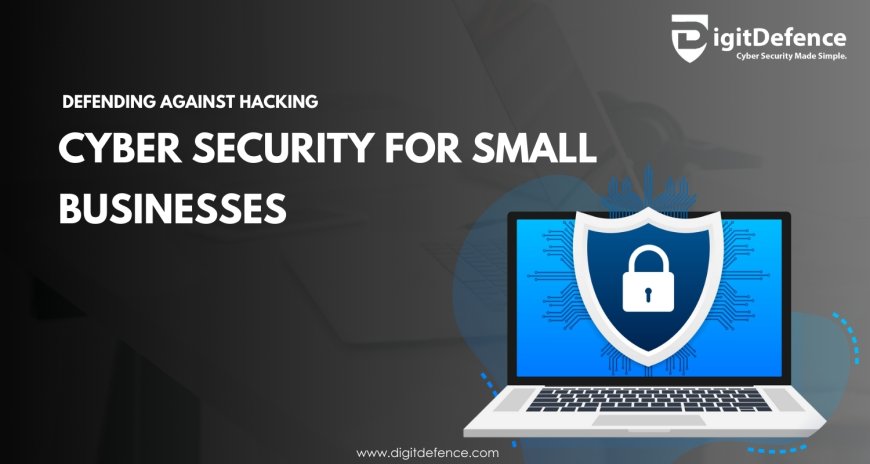Defending Against Hacking: Cyber Security for Small Businesses
Explore effective strategies for cyber security in small businesses. Learn how to protect your business against hacking threats.

Small businesses play a crucial role in the global economy, contributing significantly to job creation and innovation. However, their limited resources and often inadequate cybersecurity measures make them vulnerable to cyberattacks. In recent years, the frequency and sophistication of cyberattacks have increased, posing a significant threat to small businesses.
For small businesses with limited resources, it's crucial to focus on simple cybersecurity steps. First, educate employees about online risks like phishing. Encourage strong passwords and add extra security layers when possible. Keep software updated to fix any vulnerabilities. Control who has access to important data to prevent unauthorized use. Use basic security tools like antivirus software. Regularly back up data to avoid losing it in a cyber attack. Also, make sure third-party partners follow good security practices. These simple actions can significantly boost a small business's defense against online threats.
Cyber Protection Roadmap for Small Businesses:
Employee Training and Awareness:
Crucial Education: Providing comprehensive training to employees about cybersecurity practices is vital. It should encompass understanding and identifying various cyber threats, such as phishing emails, which trick individuals into revealing sensitive information.
Strong Passwords: Training should emphasize the importance of using strong, unique passwords and avoiding password sharing across accounts. It's essential to educate employees on creating complex passwords that include a mix of letters, numbers, and special characters.
Vigilance Against Suspicious Links: Employees need to learn to recognize and avoid suspicious links or attachments that might contain malware or ransomware. Teaching them the warning signs and best practices for handling such situations is critical.
Building a Security-Conscious Culture: Encouraging a culture of shared responsibility for cybersecurity throughout the organization is crucial. When everyone understands their role in maintaining security, the likelihood of successful hacking attempts decreases.
Regular Training Refreshers and Simulations: Regular training refreshers and simulated cyber threat scenarios help employees stay vigilant. These exercises ensure that staff members remain up-to-date with evolving threats and are better equipped to handle potential security risks.
Implementing Robust Security Measures:
Essential Tools: Investing in fundamental cybersecurity tools like firewalls, antivirus software, and intrusion detection systems forms the backbone of a secure infrastructure.
Functionality of Tools: Firewalls act as a barrier, filtering incoming and outgoing network traffic to block potential threats. Antivirus software detects and removes malicious software, while intrusion detection systems alert administrators to potential breaches.
Regular Software Updates: Consistently updating software is crucial. These updates often contain patches that fix vulnerabilities, reducing the risk of exploitation by cyber attackers using outdated software.
Regular Data Backups:
Data Protection: Establishing a reliable and regular data backup system is crucial to safeguard critical information. In the event of a breach or ransomware attack, recent and dependable backups ensure business continuity and minimize data loss.
Backup Frequency: Regular backups, ideally automated or scheduled at intervals, secure data against potential loss, ensuring that even if an incident occurs, the impact is minimized.
Partnering with Managed Security Service Providers (MSSPs):
Tailored Cybersecurity Solutions: MSSPs offer tailored cybersecurity solutions designed to meet the specific needs of a business. These services range from threat detection to incident response, providing expertise in identifying vulnerabilities and implementing effective security measures.
Continuous Monitoring and Support: With 24/7 monitoring and support, MSSPs provide ongoing protection against cyber threats. This partnership allows businesses to access advanced security measures without the need for an in-house IT team.
Establishing Incident Response Plans:
Preparedness through Plans: Developing and practicing incident response plans is critical in minimizing damage and expediting recovery in the event of a cyber breach. These plans outline step-by-step procedures to follow when facing a cybersecurity incident.
Training and Familiarization: Regular drills and simulations familiarize employees with these protocols. Practicing response plans ensures that staff members understand their roles and are prepared to execute them effectively during a real crisis, reducing the impact of an actual attack.
The importance of cybersecurity for small businesses:
Customer Trust and Reputation: Prioritizing cybersecurity builds trust with customers and partners, enhancing the business's reputation. It sets the business apart in a crowded marketplace.
Financial Stability: Recovering from cyberattacks incurs significant costs, affecting a business's financial stability. Proactive cybersecurity measures act as insurance against substantial financial losses from breaches or system downtime.
Practical Tips for Robust Security Measures
Regular Security Assessments: Conduct regular cybersecurity assessments or audits to identify vulnerabilities. This proactive approach helps in understanding potential weaknesses and taking corrective actions.
Secure Remote Access: With the rise of remote work, securing remote access to systems and data is vital. Implementing Virtual Private Networks (VPNs) and strong authentication for remote access enhances security.
Vendor and Supply Chain Security: Assess the security practices of vendors and partners who have access to your systems or data. Ensure they also maintain strong cybersecurity measures to prevent indirect breaches.
Incident Response Drills: Conduct mock cyber incident response drills to ensure employees are well-prepared to respond effectively in the event of a breach. Practice improves reaction times and reduces the impact of an actual attack.
Cyber Insurance: Consider investing in cyber insurance tailored for small businesses. This can provide financial assistance in case of a cyber incident and help cover recovery costs.
Understanding how important cybersecurity is and following these extra tips can help small businesses defend against hackers. Taking proactive steps to protect against cyber threats not only keeps the business safe but also makes it stronger in facing new dangers. This helps the business keep growing and stay stable in the long run.






























